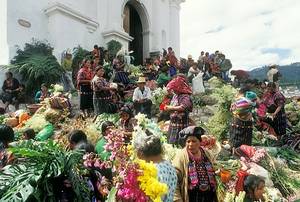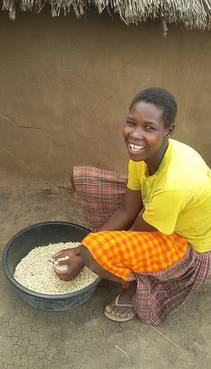Recording tenure rights of indigenous peoples and other communities with customary tenure
Encouraging states to recognize, respect and protect all tenure rights' holders and their rights, including indigenous peoples and other communities with customary tenure is a key message in the voluntary guidelines.
In many countries, much land is held under customary tenure but the recording or registration of rights has not received the same attention as the recording of other forms of tenure rights. That is changing as some countries have introduced new policies, laws and practices.
Guatemala
 Guatemala carried out a pilot project in the Bendición community to enable leaders and young people to develop a community system for recording agreements regarding land tenure and natural resources management. Civil society, representing a network of indigenous peoples and small farmers who hold rights to community forestry lands, documented legitimate tenure rights and boundaries using Open Tenure open source software. This was accompanied by the development of learning materials and a communication strategy on the recognition of tenure rights to communal lands and the local governance of tenure. FAO provided technical support and financial support was provided by United Kingdom (DFID).
Guatemala carried out a pilot project in the Bendición community to enable leaders and young people to develop a community system for recording agreements regarding land tenure and natural resources management. Civil society, representing a network of indigenous peoples and small farmers who hold rights to community forestry lands, documented legitimate tenure rights and boundaries using Open Tenure open source software. This was accompanied by the development of learning materials and a communication strategy on the recognition of tenure rights to communal lands and the local governance of tenure. FAO provided technical support and financial support was provided by United Kingdom (DFID).
Uganda
 Uganda is working with local authorities and civil society to record customary tenure rights (recognized by the Constitution) consistent with the Voluntary Guidelines.
Uganda is working with local authorities and civil society to record customary tenure rights (recognized by the Constitution) consistent with the Voluntary Guidelines.
Local authorities in Kasese district, working with the central and district governments and Makerere University School of Built Environment, issued certificates of customary ownership with a focus on women and vulnerable groups. Increased tenure security and decreased land conflicts were reported after the certificates were issued.
The certificates of customary ownership were prepared with the use of Open Tenure open source software. Doing so helped to ensure that the process for preparing the certificates complies with the law. It also diminishes the number of errors, guides the community implementers (Area Land Committees) through the process and increases the transparency of the process.
Open Tenure enabled the certificates to use satellite imagery and GPS coordinates, which improved the quality of the mapping data. FAO has provided technical support to Uganda, with financial support from the United Kingdom (DFID) under the FAO-World Bank Cooperative Programme.
